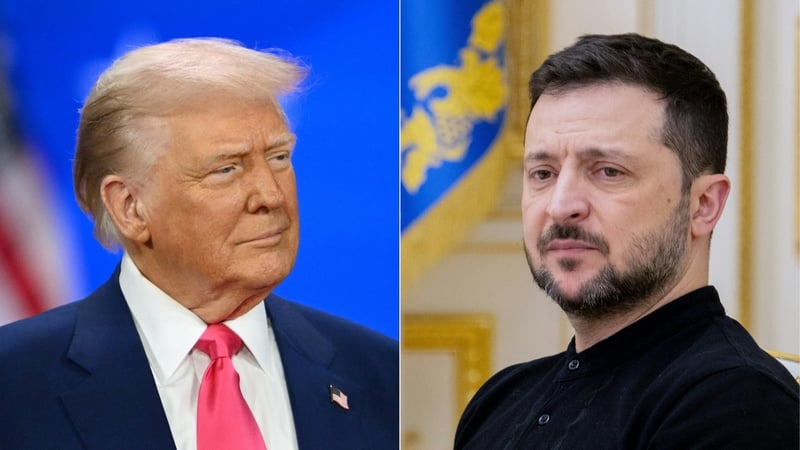Analysis: Donald Trump’s interest in Ukraine’s rare minerals shows how supply chains now shape wars and geopolitics
By Nikolaos Valantasis Kanellos, TU Dublin and Sarah Schiffling, Hanken School of Economics
The impact of wars on the supply chains that our lifestyle relies upon is profound. Wars affect transport routes and disrupt production facilities and key infrastructure. Common consequences of such disruptions are shortages or price hikes. These are caused by the efforts of companies to reconfigure their supply chains to avoid sanctions or areas affected by war.
At the same time, supply chains affect wars, forming a dynamic and interdependent relationship. Many supply chain management students are familiar with the opening lines of textbooks stating that the fate of many wars and expeditions was determined by how they managed their supply chains. Logistics and supply chains have always been essential in war. Keeping troops supplied has been a challenge since armies grew too large and technologically advanced to easily live off the land they conquered. Both Napoleon and Hitler struggled with their supply lines when invading Russia, given the vast distances and inclement weather.
Civilian supply chains have been a target in war since antiquity when the Goths, before besieging Rome, first cut off its port so no supplies could reach the city. Cutting off supply chains to cities in siege warfare may sound like a medieval strategy, but is widespread in recent wars in Yemen, Syria, and many other countries. Throughout history, many wars have been fought for access to precious resources such as gold, silver, salt, and more recently, for oil.
We need your consent to load this rte-player contentWe use rte-player to manage extra content that can set cookies on your device and collect data about your activity. Please review their details and accept them to load the content.Manage Preferences
From RTÉ Radio 1’s News at One, Professor of Economics and former advisor to the Ukrainian president Alexander Rodnyansky on the US-Ukraine minerals deal
Race for rare minerals and global competition
The latest resources of high geopolitical relevance are rare minerals, often referred to as critical raw materials. These include lithium, cobalt, nickel, and other rare earth elements, which are indispensable for manufacturing batteries and semiconductors among other technological products. The demand for rare minerals has surged due to the widespread increase in the use of modern technologies, including renewable energy production, AI, electronics, but also military systems.
In the last three years another war started on European soil, when Russia invaded Ukraine. Even though Ukraine and Russia may only account for a small proportion of the imports of major manufacturing nations like Germany and the US, they are essential suppliers of rare minerals and energy for many crucial supply chains.
As nations recognise the strategic importance of rare minerals, a global race to secure access to these resources has intensified. China is firmly in the lead due to its dominance in both mining and processing rare earths, making it a critical supplier for much of the world. For example, Germany attempted but failed to secure a massive lithium deal with Bolivia, showing the geopolitical and economic challenges in diversifying mineral resources.
We need your consent to load this rte-player contentWe use rte-player to manage extra content that can set cookies on your device and collect data about your activity. Please review their details and accept them to load the content.Manage Preferences
From RTÉ News, why does the US want Ukraine’s critical minerals?
Ukraine’s hidden treasure and the global battle for resources
Donald Trump’s recent interest in the rare minerals of Ukraine as an exchange for the monetary support that Ukraine received during Biden’s administration demonstrates the importance of supply chains in achieving his broader geopolitical and economic agenda. Trump proposed that Ukraine provide the US with access to 50% of its mineral wealth, including oil and gas, as a form of repayment for American financial and military aid. This move underscores how supply chains can shape the geopolitical strategies of major powers.
The US depends heavily on imports of these minerals, particularly from China, which dominates global supply chains for rare earths. By securing access to Ukraine’s resources, Trump aims to reduce US reliance on Chinese supply chains and strengthen domestic industries. This aligns with broader efforts to onshore production and build strategic mineral reserves.
The economic and geopolitical implications of Trump’s proposal are significant. If Ukraine accepts the US proposal, it could secure long-term American support. However, the EU is also keen on securing access to these critical raw materials. Meanwhile, Russia’s counteroffer to sell rare minerals extracted from occupied Ukrainian territories to the US, adds another layer of complexity to the situation.
We need your consent to load this YouTube contentWe use YouTube to manage extra content that can set cookies on your device and collect data about your activity. Please review their details and accept them to load the content.Manage Preferences
From DW News, what’s behind Trump’s claim to Greenland – and what do Greenlanders think about it?
These negotiations highlight the critical role of supply chains in modern warfare. Access to essential resources like rare minerals can influence not only the outcome of conflicts but also the geopolitical strategies of nations involved. As history has shown, control over supply chains can be as decisive as military might in determining the fate of wars. Trump’s previous desire to acquire resource-rich territories, such as Greenland and Canadian mineral reserves, demonstrate the US president’s desire to leverage natural resources for geopolitical advantage. Ukraine might represent an easier way of securing those supplies.
Geopolitical consequences and the future of supply chains
The pursuit of raw materials in global politics today bears striking similarities to historical colonialism. The extraction and control of valuable resources from resource-rich but geopolitically vulnerable regions have long been central to economic and political dominance, echoing past imperial strategies.
Extracting raw materials is not the only crucial part of these supply chains. They must be refined and processed before they are usable in advanced technologies. China processes nearly 90% of rare earths globally, giving it a near monopoly. This creates a strategic bottleneck, as even if nations secure raw material access, they remain dependent on China for processing, limiting their ability to achieve true resource independence in important sectors like electronics, renewable energies, aviation, and defence.
Follow RTÉ Brainstorm on WhatsApp and Instagram for more stories and updates
The views expressed here are those of the author and do not represent or reflect the views of RTÉ




